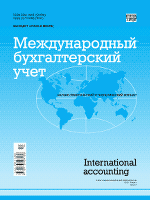Abstracting and IndexingРИНЦReferativny Zhurnal VINITI RAS Worldcat Google Scholar Online availableEastvieweLIBRARY.RU Biblioclub |
Postulates, paradigms and scientific theories: accounting perspective and contemporary assessment
Available online: 22 October 2014 Subject Heading: PROBLEMS. VIEWS. SOLUTIONS JEL Classification: Pages: 23-30
A scientific idea and its evolution are impossible without forming postulates and paradigms, which have been replaced by principles and concepts, and the system of scientific theories that becomes more sophisticated and improved and explicitly describes both general trends in the professional research existing in the accounting community and original ideas of its best representatives. It is necessary to understand scientific and historical patterns in this issue development and to reveal the continuity of identical concepts. The evolution of scientific theories is a subject matter to identify the area of theoretic statements and to assess promising trends. This enables to determine the scientific and theoretical basis to build modern accounting theories. The article examines the notions of theory, postulate, paradigm, principle, and concept. The author states the main accounting postulates and general historical patterns of evolution in terms of its five paradigms. The author has also systemized the basic characteristics of modern accounting theory. The work has examined the criteria of referring statements to the categories of a scientific theory, provides an example of accounting theories' classification, and identified their challenging behavior. The author gives a detailed account of the essence of accounting principles. For example, the business entity principle (a separate entity) means legal independence of an economic entity in relation to its owner. This principle enables to identify the contours of an enterprise: its territory, property, bank accounts, internal and external communications. The principle implies that bank accounts of an organization and of its owners are independent and do not intersect, that there should not be repayment of debt liabilities of company's owners and satisfaction of their personal needs at the expense of the organization. According to the principle of property isolation of a company, all financial and accounting information relates only to the activity of an economic unit (enterprise), but not to the activities of its owners. Keywords: postulate, principle, paradigm, concept, scientific theory, general, particular, modern, accounting theory References:
|
ISSN 2311-9381 (Online)
|
|








